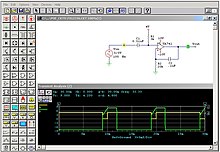| Developer(s) | Logic Design Inc. |
|---|---|
| Stable release | V14.0
/ March 2021 |
| Operating system | Windows (XP, Vista, Windows 7, Windows 8, Windows 10) |
| Type | Electronic circuit simulation |
| License | Proprietary |
| Website | www |
CircuitLogix is a software electronic circuit simulator which uses PSpice to simulate thousands of electronic devices, models, and circuits. CircuitLogix supports analog, digital, and mixed-signal circuits, and its SPICE simulation gives accurate real-world results. The graphic user interface allows students to quickly and easily draw, modify and combine analog and digital circuit diagrams. CircuitLogix was first launched in 2005, and its popularity has grown quickly since that time. In 2012, it reached the milestone of 250,000 licensed users, and became the first electronics simulation product to have a global installed base of a quarter-million customers in over 100 countries.[1]

CircuitLogix was developed by Dr. Colin Simpson, an electronics professor at George Brown College, in Toronto, Canada, and John (Bud) Skinner, a computer programmer. The electronics program has won awards including the Award of Excellence from the Association of Canadian Community Colleges (ACCC).[2]
The professional version of CircuitLogix (CircuitLogix Pro) includes over 10,000 device models, as well as 8 virtual instruments.[3] It also includes 3DLab, which is a software product that combines an interactive 3-dimensional learning environment and electronic devices and tools to enhance the user's comprehension of electronics. 3DLab virtual components include batteries, switches, motors, lamps, resistors, inductors, capacitors and instruments including oscilloscopes, Signal generators, and frequency counters.[4]
- ^ Article regarding user base
- ^ "ACCC document with article about the Electronics Technician distance Education program" (PDF). Archived from the original (PDF) on 2010-10-09. Retrieved 2007-04-26.
- ^ "CircuitLogix Pro article". Archived from the original on 2015-11-17. Retrieved 2014-10-20.
- ^ "3DLab reference". Archived from the original on 2018-11-12. Retrieved 2014-10-20.